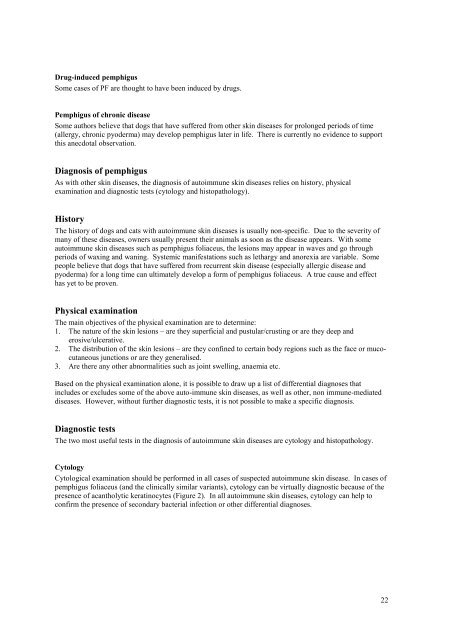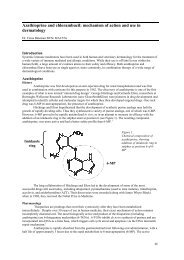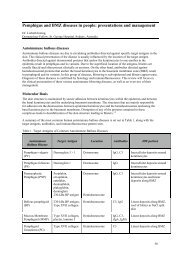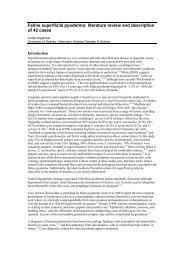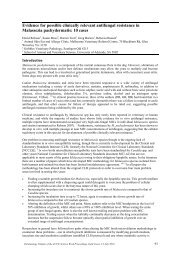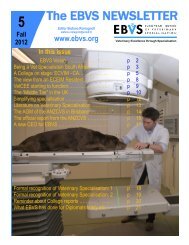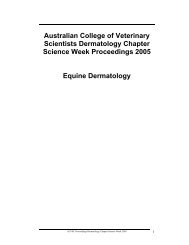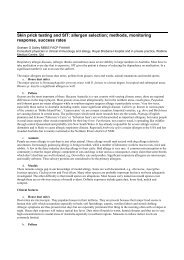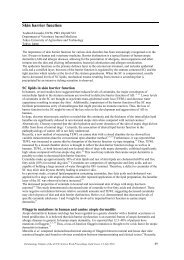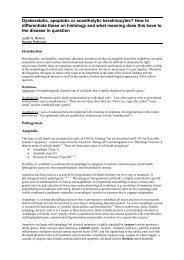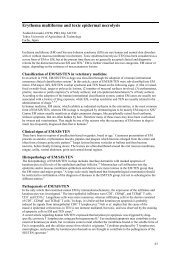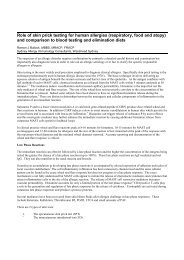Pemphigus foliaceus: review of clinical signs & diagnosis in dogs ...
Pemphigus foliaceus: review of clinical signs & diagnosis in dogs ...
Pemphigus foliaceus: review of clinical signs & diagnosis in dogs ...
Create successful ePaper yourself
Turn your PDF publications into a flip-book with our unique Google optimized e-Paper software.
Drug-<strong>in</strong>duced pemphigus<br />
Some cases <strong>of</strong> PF are thought to have been <strong>in</strong>duced by drugs.<br />
<strong>Pemphigus</strong> <strong>of</strong> chronic disease<br />
Some authors believe that <strong>dogs</strong> that have suffered from other sk<strong>in</strong> diseases for prolonged periods <strong>of</strong> time<br />
(allergy, chronic pyoderma) may develop pemphigus later <strong>in</strong> life. There is currently no evidence to support<br />
this anecdotal observation.<br />
Diagnosis <strong>of</strong> pemphigus<br />
As with other sk<strong>in</strong> diseases, the <strong>diagnosis</strong> <strong>of</strong> autoimmune sk<strong>in</strong> diseases relies on history, physical<br />
exam<strong>in</strong>ation and diagnostic tests (cytology and histopathology).<br />
History<br />
The history <strong>of</strong> <strong>dogs</strong> and cats with autoimmune sk<strong>in</strong> diseases is usually non-specific. Due to the severity <strong>of</strong><br />
many <strong>of</strong> these diseases, owners usually present their animals as soon as the disease appears. With some<br />
autoimmune sk<strong>in</strong> diseases such as pemphigus <strong>foliaceus</strong>, the lesions may appear <strong>in</strong> waves and go through<br />
periods <strong>of</strong> wax<strong>in</strong>g and wan<strong>in</strong>g. Systemic manifestations such as lethargy and anorexia are variable. Some<br />
people believe that <strong>dogs</strong> that have suffered from recurrent sk<strong>in</strong> disease (especially allergic disease and<br />
pyoderma) for a long time can ultimately develop a form <strong>of</strong> pemphigus <strong>foliaceus</strong>. A true cause and effect<br />
has yet to be proven.<br />
Physical exam<strong>in</strong>ation<br />
The ma<strong>in</strong> objectives <strong>of</strong> the physical exam<strong>in</strong>ation are to determ<strong>in</strong>e:<br />
1. The nature <strong>of</strong> the sk<strong>in</strong> lesions – are they superficial and pustular/crust<strong>in</strong>g or are they deep and<br />
erosive/ulcerative.<br />
2. The distribution <strong>of</strong> the sk<strong>in</strong> lesions – are they conf<strong>in</strong>ed to certa<strong>in</strong> body regions such as the face or mucocutaneous<br />
junctions or are they generalised.<br />
3. Are there any other abnormalities such as jo<strong>in</strong>t swell<strong>in</strong>g, anaemia etc.<br />
Based on the physical exam<strong>in</strong>ation alone, it is possible to draw up a list <strong>of</strong> differential diagnoses that<br />
<strong>in</strong>cludes or excludes some <strong>of</strong> the above auto-immune sk<strong>in</strong> diseases, as well as other, non immune-mediated<br />
diseases. However, without further diagnostic tests, it is not possible to make a specific <strong>diagnosis</strong>.<br />
Diagnostic tests<br />
The two most useful tests <strong>in</strong> the <strong>diagnosis</strong> <strong>of</strong> autoimmune sk<strong>in</strong> diseases are cytology and histopathology.<br />
Cytology<br />
Cytological exam<strong>in</strong>ation should be performed <strong>in</strong> all cases <strong>of</strong> suspected autoimmune sk<strong>in</strong> disease. In cases <strong>of</strong><br />
pemphigus <strong>foliaceus</strong> (and the <strong>cl<strong>in</strong>ical</strong>ly similar variants), cytology can be virtually diagnostic because <strong>of</strong> the<br />
presence <strong>of</strong> acantholytic kerat<strong>in</strong>ocytes (Figure 2). In all autoimmune sk<strong>in</strong> diseases, cytology can help to<br />
confirm the presence <strong>of</strong> secondary bacterial <strong>in</strong>fection or other differential diagnoses.<br />
22


